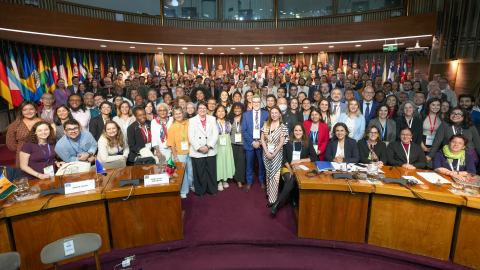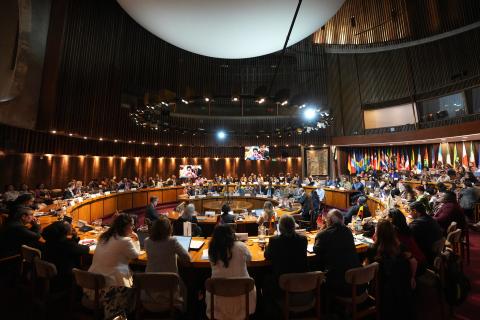Briefing note
'Latin America and the Caribbean must adopt a positive agenda for the construction of a new international order and make a firm commitment to its implementation,' the Economic Commission for Latin America and the Caribbean (ECLAC) told its member governments during its 29th Session. This positive focus will take advantage of an essential lesson from history: mere resistance to processes as profound as the current phase of globalization will fail in the long term.
In its report Globalization and Development ECLAC proposes some desirable alternatives for a more solid and equitable form of globalization, and better participation in the process. Its agenda seeks to overcome the deficit in global governance in order to ensure that 'globalization becomes a positive force for all the people of the world,' as the United Nations Millennium Declaration proposes.
In the absence of suitable institutions, globalization is proving to be a disintegrative force, which makes 'a virtuous circle of complementary global, regional and national institution-building' necessary to cope with these forces, the paper points out. The current international order consists of great gaps that make it necessary to base any effort at strengthening this system on the development of 'global institutions that respect diversity' and guarantee 'equitable participation in accordance with suitable rules of governance' for all developing countries.
ECLAC´s proposed agenda underlines the fundamental importance of national strategies in consolidating democracy. At the same time, ECLAC proposes changes to general institutions that would shelter them more from external vulnerability, and expand margins for national policy design and instrumentation. Finally, it emphasizes the critical importance of sub-regional and regional bodies to articulate actions in the two areas mentioned here.
ECLAC suggests that national strategies in the global era should be based on solid democratic social pacts that guarantee political stability, on behaviour by all relevant actors that guarantees contract security, and on the creation of an impartial, efficient state bureaucracy. These elements are all crucial, but in practice are only the backdrop for what is really necessary. To grow and face the challenges of development today, the region's countries must deal with at least four areas:
-
Policies that reduce macroeconomic and financial vulnerability and stimulate productive investment;
-
Policies to develop systemic competitiveness;
-
Policies that take into account environmental agenda priorities;
-
Active policies in the areas of education, employment and social protection
Because none of these fields provides a single universal model, there is a wide range of activities possible for institutional apprenticeship and exercising democracy.
According to Globalization and Development, recent experiences in the region demonstrate the need for a broader view of stability, because macroeconomic imbalances are costly in both economic and social terms. Strategy should focus on avoiding unsustainable public and private deficits, watching out for financial imbalances and controlling inflation and instability in the economy's real variables. To do so, counter-cyclic policies are vital, which take into account the whole economic cycle and expand the time horizon for macroeconomic planning. The prudent management of flexibility is, in the long term, a better instrument than adopting rigid rules as a means for creating confidence in the authorities.
Economic growth is inseparable from a constant transformation of productive structures, whose purpose must be the creation of systemic competitiveness. One component is the development of innovative systems that accelerate the accumulation of technological capabilities. Another is support for diversification of productive structure, which requires expanding products and export destinations, improving productive linkages around the export base and foreign direct investment, and consolidating productive clusters. The third component is providing quality infrastructure services.
In environmental terms, it is necessary to improve the linkages between economic development and environmental sustainability, as well as providing national and regional markets with environmental services offering overall value. In the social field, national strategies must look after three areas that mutually reinforce each other: education, employment and social protection.
Finally, the global agenda proposed by ECLAC aims to achieve three objectives: 'guarantee a suitable supply of general public goods; steadily overcome the imbalances in the world order; and gradually build an international social agenda based on rights.'
In summary, its global agenda includes:
-
Provision of general public goods of a macroeconomic and financial nature;
-
Recognition of sustainable development as a general public good;
-
Correcting financial and macroeconomic imbalances;
-
Overcoming productive and technological imbalances;
-
Including labour migration within the international agenda;
-
Progressing toward the consolidation of human rights, in the civil, political, economic, social and cultural sense within the general concept of global citizenship.
Similarly, the regional and sub-regional levels are critically important to intermediation between national and global orders. Four main arguments support this view: a network of global and regional institutions is more efficient than a handful of organizations with global functions only; the inequality among the actors involved in global processes makes a regional voice essential; regional institutions generate a much greater 'sense of ownership'; autonomy makes more sense from a regional perspective.


